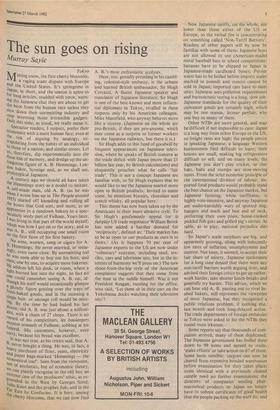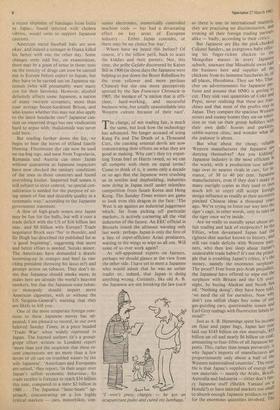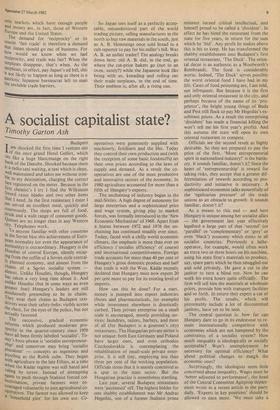The sun goes on rising
Murray Sayle Murray Sayle
Tokyo Melting snow, the first cherry blossoms, a raging trade dispute with Europe and the United States. It's springtime in JaPan, in short, and the season is upon us for long articles, studded with zeros, warn- ing the Japanese that they are about to get the boot from the human race unless they slow down their unremitting industry and stoP inventing those irresistible gadgets. only this time, as usual, we really mean it. Spectator readers, I suspect, prefer their economics with a more human face, even at the risk of arguing by analogy, ex- trapolating from the habits of an individual t° those of a nation, and similar errors. Let us, therefore, dip experimentally into the flour-bin of memory, and dredge up the un- forgotten figure of A. B. Hemmings, Lon- don baker, Scrooge and, as we shall see, prototypical Japanese. A century ago we should all have taken the Hemmings story as a model to imitate. A self-made man, old A. B. (as he was when I wrote him up in The People around 1,955) started off kneading and rolling all the hours that God sent, and more, as an apprentice in a rundown bakery in a spec- tacularly seedy part of Fulham. Years later, I was living in that part of the world myself, which was how I got on to the story, and so was A. B., still occupying one small room on the first floor of his first bakery.
No wine, women, song or cigars for A.
B• Hemmings. He never married, or seem- InglY, even came close. By unremitting toil he was soon able to buy out his boss, and then, one by one, to acquire more bakeries. He seldom left his desk, or room, where a light burned late into the night. In fact no one could remember seeing A. B. eat, al- though his staff would occasionally glimpse af ghostly figure grazing over the trays of fresh-baked goods, and in the morning a single bun or sausage roll would be miss- ing. By the time he had baked his last dozen, old A. B. was just about a million- aire, with a chain of 27 shops. There is no record of his competitors, les boulangers trloYens sensuels of Fulham, sobbing at his funeral. His customers, however, were sorry, because his bread was excellent. it was not true, as his critics said, that A. hnever bought a thing. He was, in fact, a neavY purchaser of flour, yeast, electricity and Paper bags. marked 'Hemmings — the economical loaf. Seen from the viewpoint, not of aesthetics, but of economic theory, we can plainly recognise in the old boy an extreme case of the producers' ethic, as ex- pounded in the West by Georges Sorel, "I°11n Knox and the prophet Job, and in the Far East by Confucius. It is here, among the cherry blossoms, that we can now find
A. B.'s most enthusiastic acolytes.
Here, too, genially presiding in his rambl- ing, colonial-style embassy, is the urbane and learned British ambassador, Sir Hugh Cortazzi. A fluent Japanese speaker and translator of Japanese literature, Sir Hugh is one of the best-known and most influen- tial diplomats in Tokyo, rivalled in these respects only by his American colleague, Mike Mansfield, who anyway behaves more like a viceroy. (Japanese on the whole are pro-British, if they are pro-anyone, which may come as a surprise to former workers on the Japanese railways, but there it is.) Sir Hugh adds to this fund of goodwill by frequent appearances on Japanese televi- sion, where he speaks of British concern at the trade deficit with Japan (more than £1 billion last year, by British calculations) and eloquently preaches what he calls 'fair trade'. This is not a concept Japanese are familiar with, so Sir Hugh explains that he would like to see the Japanese market more open to British products. Invited to name some, he mentions biscuits, chocolate and scotch whisky, all popular here.
This theme has now been taken up by the Atnericans in their more abrasive style. To Sir Hugh's gentlemanly appeal for le fairplay US trade negotiator William Brock has now added a harsher demand for `reciprocity', defined as: 'Their market has to be as open to our products as ours is to theirs.' (As it happens 70 per cent of Japanese exports to the US are now under 'voluntary' restraint, including steel, tex- tiles, cars and television sets, but in the in- terests of harmony we'll press on.) The new shoot-from-the-hip style of the American complaints suggests that they come from the man in the saddle himself. Was it not President Reagan, running for the office, who said, 'Let them sit in their cars on the Yokohama docks watching their television sets'? Now Japanese tariffs, on the whole, are lower than those either of the US or Europe, so the verbal fire is concentrating on something called 'Non-Tariff Barriers'. Readers of other papers will by now be familiar with some of them: Japanese boys are not allowed m use (American-made) metal baseball bats in school competitions; bananas have to be shipped to Japan in Japanese-made cardboard boxes; Perrier water has to be boiled before import; scales marked in pounds and ounces cannot be sold in Japan; imported cars have to meet strict Japanese anti-pollution requirements and bureaucratic testing is a long, slow job. Japanese standards for the quality of their consumer goods are certainly high, which may be one reason, lecteur perfide, why you buy so many of them.
Other NTBs are more general, and may be difficult if not impossible to cure: Japan is a long way from either Europe or the US, so freight rates are high; the people persist in speaking Japanese, a language Western businessmen find difficult to learn; their houses are small, making big refrigerators difficult to sell, and on many levels, the Japanese just don't play cricket, so that bats, balls and stumps are slow-moving items. From the strict economic principle of the international division of labour, im- ported food products would probably stand the best chance on the Japanese market, but Japanese farming, while inefficient, is highly vote-intensive, and anyway Japanese are understandably wary of spotted dog, bangers and mash and best end of neck, preferring their own plain, home-cooked pickled fish guts and grilled pig's uterus. At table, as in play, national prejudice dies hard.
So Japan's trade surpluses are big, and apparently growing, along with indecently low rates of inflation, unemployment and interest. Not keen, it seemed, to accept their fair share of misery, Japanese spokesmen for a long time denied that there were any non-tariff barriers worth arguing over, and advised their foreign critics to get up earlier, work harder, take shorter lunch-breaks and generally try harder. This advice, which we can hear old A. B. passing out to rival lie- abed bakers, still represents the viewpoint of most Japanese, but they recognised a public relations problem, if nothing else, last month and took long-delayed action. The trade departments of foreign embassies in Tokyo were asked to list the NTBs they found most irksome.
Some reports say that thousands of com- plaints arrived, many of them duplicated. The Japanese government has boiled these down to 99 items and agreed to study, 'make efforts' or take action on 67 of them. Some seem sensible: cargoes can now be cleared from expensive bonded warehouses before examination for duty takes place; items identical with a previously cleared sample need no further examination; the directors of companies sending phar- maceutical products to Japan no longer have to submit certificates of good health (but the people packing up the stuff do, and a recent shipment of bandages from India to Japan, found infected with cholera vibrios, would seem to support Japanese caution).
American metal baseball bats are now okay, and indeed a teenager in Osaka killed his father with one the other day. Some changes seem odd but, on examination, there may be a grain of sense in them: tests on the toxicity of drugs can now be carried out in Europe before export to Japan, but they have to be carried out on Japanese na- tionals (who will presumably want many yen for their heroism). However, alcohol definitely affects some Japanese, a nation of many two-pot screamers, more than your average booze-hardened Briton, and who knows whether this may not also apply to the latest headache cure? Japanese cau- tion on imported drugs has one vindication hard to argue with: thalidomide was never sold here.
But reading further down the list, we begin to hear the horns of elfland faintly blowing. Fluorescent dye can now be used on tea-bag tags, and meat from Yugoslavia, Romania and Austria can enter Japan without quarantine as Japanese inspectors have now checked the sanitary conditions of the zoos in those countries and found everything kosher. Imported bull semen is still subject to strict control, 'as special con- sideration is needed for the purpose of us- ing semen of fine and desirable quality in a systematic way,' according to the Japanese government statement.
A flow of high-grade semen into Japan may be fun for the bulls, but will it cure a trade deficit with the US of $16 billion last year, and $8 billion with Europe? Trade negotiator Brock says `No' in thunder, and Sir Hugh has described the published list as 'a good beginning', suggesting that more and better effort is needed, Suzuki minor. The Americans have demanded a drastic loosening-up in oranges and .beef (a ran- ching president throwing his lasso in?) and prompt action on tobacco. They don't in- sist that Japanese should smoke more, as males here are already the world's heaviest smokers, but that the Japanese state tobac- co monopoly should import more American cigarettes, with or without the US Surgeon-General's warning that they are likely to kill you.
One of the more temperate foreign reac- tions to these Japanese moves has ap- peared, I am pleased to record, in our own beloved Sunday Times, in a piece headed 'Trade War' when widely reprinted in Japan. The learned authors (it's a group- grope effort written in London) report 'more than just the suspicion that these re- cent concessions are no more than a few drops of oil cast on troubled waters by the wily Japanese'. 'Americans and Europeans are united,' they report, 'in their anger over Japan's selfish economic behaviour. Its trade surplus is forecast to reach $34 billion this year, compared to a mere $2 billion in 1980 . . . The Japanese "laser-beam" ap- proach, concentrating on a few highly critical markets — cars, motorbikes, con-
sumer electronics, numerically controlled machine tools — has had a devastating effect on key areas of European industry . . . Either Japan concedes, or there may be no choice but war.'
Where have we heard this before? Of course, it's the yellow peril, back to scare the kiddies and their parents. Not, this time, the gelbe Gefahr discovered by Kaiser Bill in 1900 (in those days the Japanese were helping us put down the Boxer Rebellion by the 'even yellower and more perilous Chinese) but the one more perceptively spotted by the San Francisco Chronicle in 1905, the menace of 'a nation that is effi- cient, hard-working, and successful business-wise, but totally unassimilable into Western culture because of their race'.
The charge, of not trading fair, is much the same, but look how the technology has advanced. No longer accused of using Kung Fu and The Death of a Thousand Cuts, the cunning oriental devils are now concentrating their efforts on what they are good at making. Why can't they try expor- ting Texas beef or Harris tweed, so we can all compete with them on equal terms? Come to think of it, it seems only a decade or so ago that the Japanese were crushing us in textiles and shipbuilding, industries now dying in Japan itself under relentless competition from South Korea and Hong Kong. The Sunday Times writers are game to look even this dragon in the face: 'The West is up against an industrial juggernaut which; far from picking off particular markets, is actively cornering all the vital industries of the future. An EEC official in Brussels issued the ultimate warning only last week: perhaps Japan is only the first of a line of super-efficient Asian producers, waiting in the wings to wipe us all out. Will none of us ever work again?
As self-appointed experts on fairness, perhaps we should glance at the view from the other side. I have yet to meet a Japanese who would admit that he was, an unfair trader or, indeed, that Japan is doing anything wrong. Certainly, like old A. B. the Japanese are not breaking the law (such"
'I won't press charges — he got an acupuncture point and cured my lumbago.'
as there is 'one in international matters), they are practising no discrimination, and treating all their foreign trading partners alike — badly, according to their critics. But Japanese are like the pink-cheeked Colonel Sanders, an overgrown baby offer- ing his finger-ricken chicken to the Mongolian masses in every Japanese suburb, unaware that Mitsubishi owns half the business here and supplies all the chickens from its immense hatcheries in, of all places, Hiroshima. They see Mrs That- cher on advertisements for Japanese per- fume and assume that HMG is getting its cut. They sink vast quantities of Coke and Pepsi, never realising that these are fran- chises and that most of the profits stay in Japan. They compare the spacious Western streets and roomy homes they see on televi- sion or visit on their group holidays with their own dolls' houses and parkless, rabbit-warren cities, and wonder what all the jealousy is about. But what about the cheap, reliable Western manufactures the Japanese are denying themselves? Are you kiddinS. Japanese industry is the most efficient in the world, with a production cost advan- tage over its nearest rivals in cars, for in- stance, of 30 to 40 per cent. Japanese manufacturers, even if they don't make as many outright copies as they used to (rot much left to copy) still accept foreign design influence as readily as their ancestors pinched Chinese ideas a thousand years ago. We're trying to force our way into the tiger's cage, in other words, only to take on the tiger once we're inside.
Are we really so morally upset about un- fair trading and lack of reciprocity? In the Fifties, when devastated Japan had the tightest-shut market known to history, and still ran trade deficits with Western part- ners, who then lost sleep about Japan .s undesirable trade habits? It's not the princi- ple that is troubling Japan's critics, it's the money, namely the enormous surpluses. The proof? Free from pro-Arab prejudice, the Japanese have offered to wipe out the surpluses with Britain and the US over- night, by buying Alaskan and North Sea oil. 'Nothing doing', they have been told, 'we need the oil for ourselves. Now why don't you selfish chaps buy some of our gas-guzzling cars, questionable semen and Earl Grey teabags with fluorescent labels in- stead?'
Just as A. B. Hemmings spent his income on flour and paper bags, Japan last yea,r, laid out $143 billion on raw materials, $5' billion on oil and nearly $6 billion on coal' amounting to four-fifths of all Japanese in!' ports. This, rather than innate perversity, is why Japan's imports of manufactures are proportionately only about a half of the Western industrialised countries'. The trou- ble is that Japan's suppliers of energy and raw materials — mainly the Arabs, Brazil, Australia and Indonesia — either don't fan- cy Japanese stuff (Sheikh Yamani' on a, Honda?) or have internal markets too small to absorb enough Japanese products to PO for the enormous quantities involved. The
Only markets which have enough people and money are, in fact, those of Western Europe and the United States.
The demand for 'reciprocity' or its Cousin 'fair trade' is therefore a demand that Japan should go out of business. For how would we know when we had reciprocity, and trade was fair? When the surpluses disappear, that's when. As the surpluses, in effect, pay Japan's oil bill, this Is not likely to happen as long as there is a Patriotic Japanese bureaucrat left to man the invisible trade barriers.
So Japan sees itself as a perfectly accep- table, misunderstood part of the world trading picture, selling manufactures in the north to buy raw materials in the south, just as A. B. Hemmings once sold bread to a cub reporter to pay for his miller's bill. Was A. B. an unfair trader? The analogy breaks down here: old A. B. did, in the end, go where the cut-price bakers go (not to an oven, surely?) while the Japanese look like being with us, kneading and rolling out their trade surpluses, to the end of time. Their emblem is, after all, a rising sun.






































 Previous page
Previous page